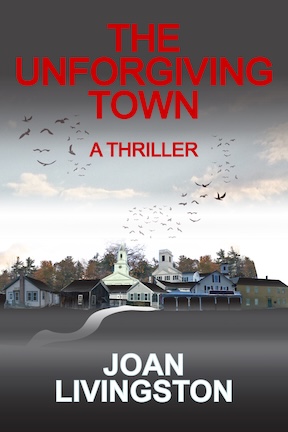Ta-da. Today I reveal the cover for my next book, The Unforgiving Town. And here’s a little more news — the novel, which launches April 7, is ready for pre-order at 99 cents. The link’s below.
What’s The Unforgiving Town about? A week after his release from prison, Al Kitchen is found dead beside a bicycle on a back country road. Al served 18 years in prison for beating a well-liked man to death during a botched robbery, but most everyone in this small town preferred he died in prison.
This book’s a sequel to The Sacred Dog, but I decided to make this one a thriller mystery because I like the puzzle of creating one. I will be sharing posts about the characters, themes, and setting to entice you to read The Unforgiving Town.
But back to the cover, which is the creation of my artist son, Ezra Livingston. As we did with the other covers Ezra has built, he and I talked about the story. How do you capture a 66,000-word novel in pictures? We agreed we wanted some semblance of a small town. I also wanted birds because they are in a pivotal scene.
So, Ezra drove around the hilltowns taking photos of buildings that typically would be in a rural New England town. Being winter, most were covered and surrounded by snow, but Ez knew how to take care of that. I offered a photo I had of a building I wanted included. And then Ez worked his magic assembling the fictional town you see above.
Ez created a foreboding sky via the upper darkness, clouds. and the birds rising above the town. I suggested the title’s lettering should be a blood red.
Sunday it all came together.
So back to pre-order. Here is the link to The Unforgiving Town. Spend 99 cents and The Unforgiving Town will pop magically into your Kindle app on April 7. If you do, thank you very much.
